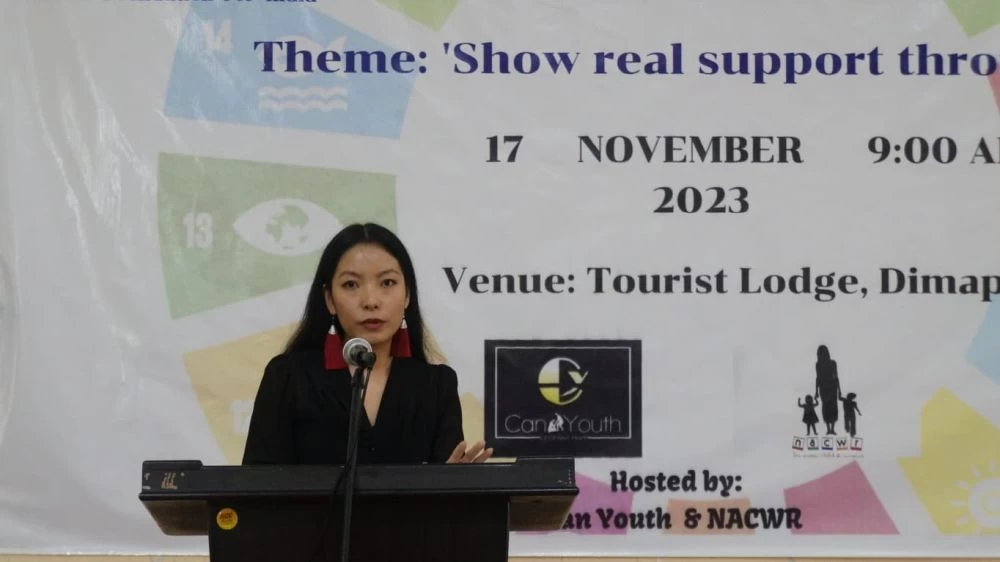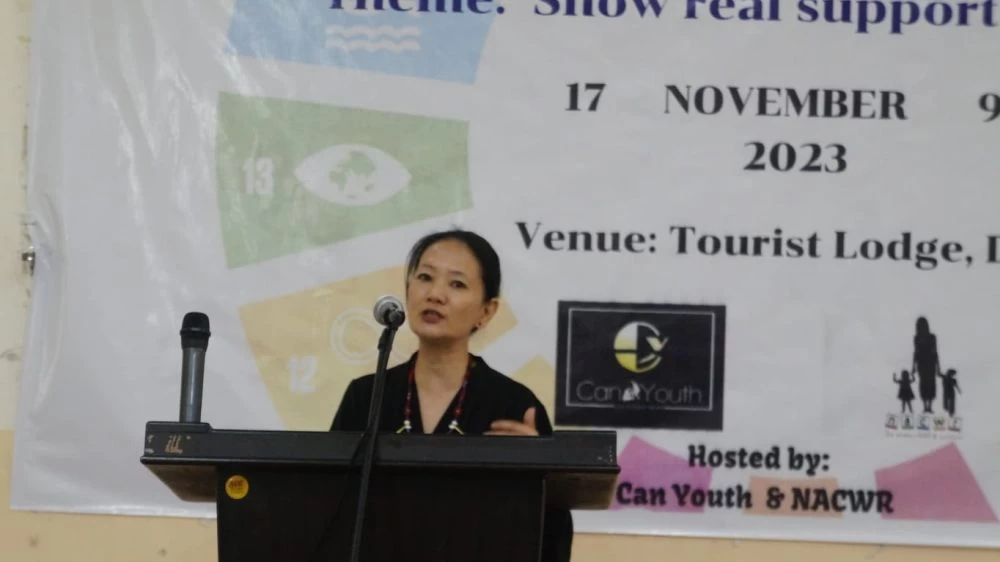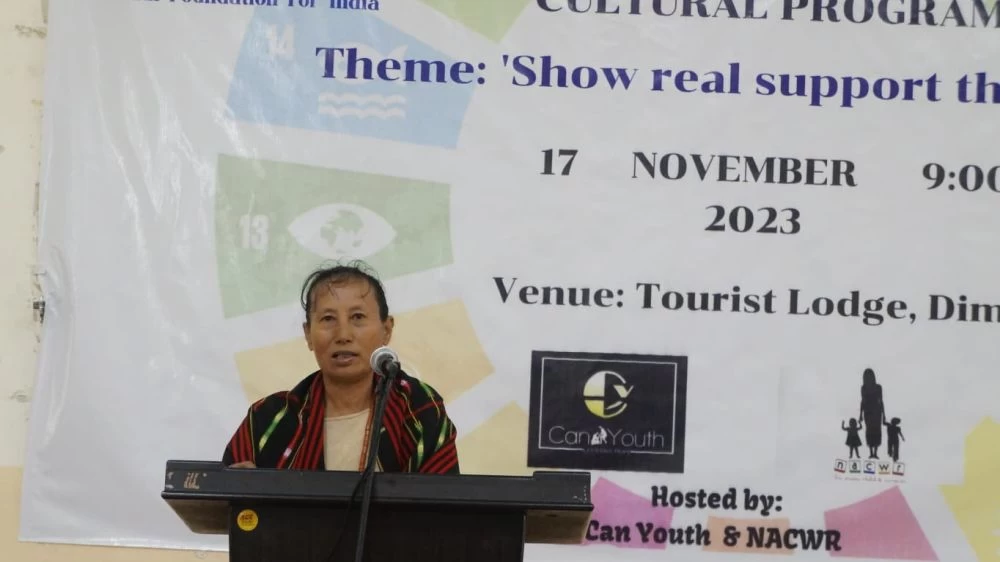Morung Express News
Dimapur | November 18
“When we look at the United Nations 17 Sustainable Development Goals (SDGs), we see a beautiful provision for human rights. The SDG goals were adopted in 2015 with a 15-year target to achieve all the 17 goals. These goals include you and me,” said NK Keny, social worker and proprietor of an orphanage home, Love Care Home.
She was speaking at the Women’s Leader Meet cum Cultural Programme which was held at Tourist Lodge, Dimapur on Friday. The event was organised by National Foundation for India (NFI) with CAN Youth and Nagaland Alliance for Children and Women Rights (NACWR). The project is co-funded by European Union.

Speaking on the topic – “Inclusive support towards women’s participation and equal opportunities for leadership at all levels,” NK Keny shared briefly on her upbringing as a Sümi Naga. “Back then there were no family planning, and we thought women were made for domestic work and to look after the children only.”
Focusing on SDG 5, which targets to achieve gender equality and empower all women and girls, she stated that gender equality and sustainable development has to be balanced, whether it be on the economic or environmental front, sustainability or in the mission statement as well.
She said that gender disparities in the Naga context is still high while highlighting that the percentage of women in local governments and in managerial positions is still significantly less than that of men. “We are not being equally treated and all these things should end.”

While regretting that there are people in the society who get opportunities, “but do not open doors for others,” she beseeched the gathering to help and promote the younger generation and be a channel of hope for the Nagas.
Keny also touched on the aim to ensure universal access to sexual and reproductive rights. The social worker who also founded the Nagaland Alliance for Children and Women Rights (NACWR) and now an Advisor, further called upon the younger women to support and show up for one another. “Please reach out to each other and show real support through action, and not just words.”
Maintaining that the Sümi community has an inclusive approach, she highlighted the inclusion of two women as executive member for decision-making in the apex body of the Western Sümi Hoho (WSH) in 2019. Viewing this event as a beginning to inclusivity of women’s voices in the Naga society, she held that the act itself is fulfilling the SDG Goal 5. All these were possible because the Western Sumi Totimi Hoho (WSTH), the apex women body of the Western Sümi area approached the menfolk, maintained Keny. “Until and unless we voice out, how will menfolk come and work with us,” she stated, while urging the women to learn to approach and ask for help when needed.
After her father’s passing at the age of six, Keny helped her mother in the farm and took on the task of looking after the younger siblings. Through sheer will and determination, Keny went on to get a double master’s degree and with her own savings, bought a plot of land in Dimapur and eventually founded Love Care Home. “If you have land, you have the right.”
“Why not minimise your expenditure and save money to buy your own land,” she prodded the young women.

Women mostly affected by water crisis
Speaking on “Role of women in understanding the importance of managing water needs and sanitation,” Arenzungla Jamir from Sisterhood Network, emphasized on what is happening on the ground connecting it to the national context and internationally agreed goals on SDG 6 which targets ‘Clean water and sanitation.’ She briefed on the researchand projects that the Network undertook in the community.
Stressing on the need to have realistic projects, Jamir said that through their research and involvement in Samziuram village under Peren district of Nagaland, the team found out that women are the primary users and managers of water resources, from fetching, to cooking, washing, cleaning, watering flowers etc.
Women in Samziuram village are facing systemic barriers to proper supply of water and sanitation which is affecting their livelihood, health and well-being. Women are mostly affected by water crisis in the village because mothers and daughters are duty-bound to fetch water even when occupied with various unpaid care work.
Jamir disclosed that women are not only overwhelmed with the household work, but face many issues such as domestic violence, sexual and reproductive health issues, estranged relationships and mental stress due to water problem, mostly in the villages. The study also found that girls miss schools due to water problem.
Gender inequality also adds to the problem of water scarcity in the village because of women’s lack of information, as according to Naga customary practices; women are not included in the village council which is the main decision-making body. The inequality or discrimination against the women largely rest on patriarchal control of resources and patriarchal authoritative governance, maintained Jamir.
Nonetheless, she exuded hope that Sisterhood Network together with Samziuram Women Society are working for a transformative development model and monitoring the Sustainable Development Goals that demand for access to water and sanitation. “The aim is to enhance the capacity and inclusion of women to actively participate in SDG processes.”
Expressing that women have many creative ideas to contribute, she held that spreading awareness on the issue is vital. Unless we address these issues, we are not going to develop, she remarked while adding that acting now is key. “There is hope in including women and girls in the decision-making process of the society,” said Jamir.
Earlier during the event, Azungla James from Sisterhood Network and President of NACWR delivered the keynote address, while Jenpu Rongmei welcomed the gathering. Group discussion and presentation were also held with an aim to create an inclusive networking platform for women leaders at the local level. Katini Eshena, Dimapur Field Coordinator, NFI delivered the vote of thanks.
The NFI is implementing the project ‘Leave No One Behind: Building Pathways for Peace in the Northeast via engagement of CSO/Youth leaders’ since 2020. It is presently working with ten multi-ethnic groups in Assam, Manipur and Nagaland to enhance community participation and sensitize their role in all development processes.







 Meet R.N. Ravi, who is mediating peace with the Nagas
Meet R.N. Ravi, who is mediating peace with the Nagas What Does Your Face Say About Your Health?
What Does Your Face Say About Your Health? An orbiting message of peace
An orbiting message of peace The last Konyak headhunters of Nagaland
The last Konyak headhunters of Nagaland










Leave a Reply
Your email address will not be published. Required fields are marked (required)